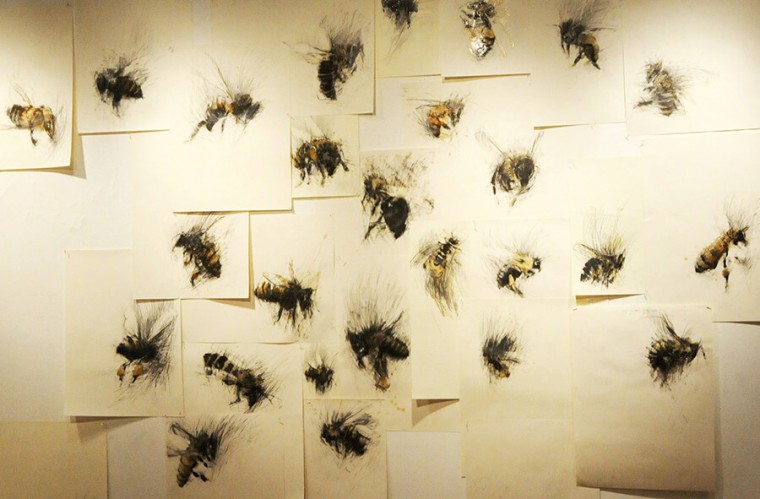 Craig Goodworth, VČELA (graphite and shellac), 2019
Craig Goodworth, VČELA (graphite and shellac), 2019
Free Market Value
We heard a near bird | this morning “So near!”
we thought in | unison Tracked
like stutters A series of | bleats Does this increase
the free market | value of our
property? We’re cramped | inside the hovel
sweeping it out | as best we can
Please give us a reasonable | 300-piece puzzle
that we might | calm ourselves
with some achievement | Or we could bake
snickerdoodles | A pizza slice
could be the apex of our | day We could take a
painting class | All of us in
smocks “accidentally” | smudging paint on our
hands and sleeves | Why yes I
took a painting class last | evening I took a serious
beating I mean | we painted
harbor ships at sunset | copied stroke for stroke the
heavy brushstrokes | of our capable
instructor Here’s what we | deny ourselves and here’s
what we deny | each other
________________________
Oni Buchanan
Review by Massimo Fantuzzi
Parallel to our world ruled by the monetary laws of the free market, So near! another world lives and breathes and sometimes, whilst remaining hidden, makes itself heard.
So far so good. However, having cognition of it and being reached by its bleats can create confusion or even sheer panic and can potentially throw us into all sort of silly moods.
Silly is good, it makes the reality this side of the fence less obtuse and the neighbouring otherworldly reality less alien.
That said, we cannot always unravel its syntax or grasp its grammar. As suggested by Oni, the language of art could, maybe, perhaps, try to build a bridge and narrate the invisible realm living the other side of the partitioning wall.
Unfortunately, all poetry classes have been booked and self-isolating instructors speak to us via a link badly afflicted by a jolty connection. We’ll have to improvise and fill the gaps ourselves – and we only have our words for it.
Review by Mary Giudice
Oh, Oni. When I read her work I feel like I’m accessing a completely different plane of thinking and I enjoy leaning in to this arrangement of words that I could never, ever write. Buchanan’s background as a musician surfaces in this as in many of her pieces. The vertical dashes give the two sides of the poem a call and response feeling…and the look of music measures on the page. At least the dashes work this way for the first half of the poem–the one that is a jumble of capitalist, suburban, consumerist grasping for comfort in pizza and puzzles.
And painting! But something changes in the art class and the dashes start to feel more like slashes of the paintbrush as the words become more disjointed too. The rhythm and slashes feel more violent here, but also things get realer– at last it’s clear:
“…Here’s what we | deny ourselves and here’s
what we deny | each other “
What?
I want to know what these things are, and I want to see the painting.
